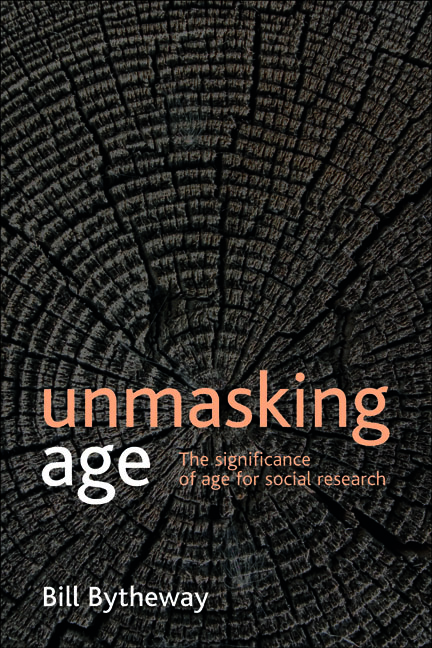Book contents
- Frontmatter
- Dedication
- Contents
- List of figures and tables
- Acknowledgements
- one Introducing age
- two Researching age
- three Age and time
- four Representations of age
- five Growing older in an ageing body
- six Being older
- seven A great age
- eight The ageing population
- nine Gerontologists and older people
- ten Getting real
- Postscript
- Notes
- Appendix
- References
- Index
three - Age and time
Published online by Cambridge University Press: 07 September 2022
- Frontmatter
- Dedication
- Contents
- List of figures and tables
- Acknowledgements
- one Introducing age
- two Researching age
- three Age and time
- four Representations of age
- five Growing older in an ageing body
- six Being older
- seven A great age
- eight The ageing population
- nine Gerontologists and older people
- ten Getting real
- Postscript
- Notes
- Appendix
- References
- Index
Summary
Clocks and calendars provide a scale against which temporal change can be plotted. However, Jan Baars (2007) warns that ‘a large part of the gerontology community’ is still under the ‘spell’ of predictions based upon chronological age (p 2). His concern is that gerontology should focus on the causes of ageing rather than the correlates of chronological age:
While it is true that all causal relations are also temporal relations, or relations working ‘in time’, it would be wrong to identify causality with time or to reduce the process of aging to the causal effects of time. (Baars, 2007, p 4)
In his paper proposing a ‘triple temporality’ of ageing he begins by noting how:
The identification of aged research populations […] builds on chronological age and presupposes an organization of the life course in which chronological time has become an important instrumental perspective. Concepts such as age groups, age norms, or age grading presuppose chronological age as the typical instrument to regulate many transitions or entitlements. (pp 16-17)
He goes on to argue that:
We are getting older with every tick of the clock, but this ‘older’ has a precise meaning only in a chronological, not gerontological sense. (p 17)
Nevertheless, he acknowledges the power of age norms and age regulations, and so his triple temporality brackets chronological age with personal experience and narrative articulation. He develops the case for a subjective time perspective:
What we tend to think of as our selves has a lot to do with the ability to situate our lives in the interrelated temporal dimensions of past, present, and future. (pp 28-9)
Baar's third temporality, narrative articulation, is based upon Ricoeur's emplotment and the reconstruction of personal experiences as stories to be shared. Contrasting the grand narrative of the anti-ageing industry with that of care providers, he suggests that in both contexts narratives are not intended to be listened to; rather they are there to keep older people ‘buying and busy’ (p 36). Advocates of anti-ageing treatments would have you believe that by buying their products, you can ‘turn back the clock’, and the providers of care services aim to ‘keep you independent for as long as possible’.
- Type
- Chapter
- Information
- Unmasking AgeThe Significance of Age for Social Research, pp. 51 - 74Publisher: Bristol University PressPrint publication year: 2011



